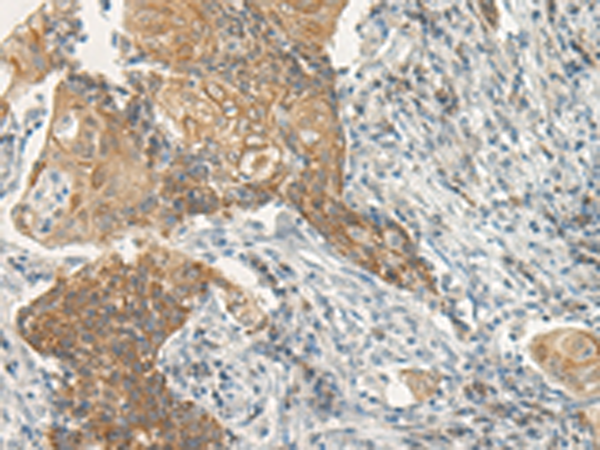
| WB | 咨询技术 | Human,Mouse,Rat |
| IF | 咨询技术 | Human,Mouse,Rat |
| IHC | 咨询技术 | Human,Mouse,Rat |
| ICC | 技术咨询 | Human,Mouse,Rat |
| FCM | 咨询技术 | Human,Mouse,Rat |
| Elisa | 咨询技术 | Human,Mouse,Rat |
| Aliases | VPAC2; VPAC2R; VIP-R-2; VPCAP2R; PACAP-R3; DUP7q36.3; PACAP-R-3; C16DUPq36.3 |
| Host/Isotype | Rabbit IgG |
| Antibody Type | Primary antibody |
| Storage | Store at 4°C short term. Aliquot and store at -20°C long term. Avoid freeze/thaw cycles. |
| Species Reactivity | Human, Mouse, Rat |
| Immunogen | Synthetic peptide of human VIPR2 |
| Formulation | Purified antibody in PBS with 0.05% sodium azide and 50% glycerol. |
+ +
以下为关于CCR5(CD195)抗体的3篇文献概览,涵盖不同研究领域:
---
1. **标题**:*PRO 140: A Humanized CCR5 Antibody for HIV-1 Therapy*
**作者**:Jacobson, J.M. et al.
**摘要**:该文献报道了人源化单克隆抗体PRO 140在HIV-1治疗中的临床试验结果,显示其通过阻断CCR5受体有效抑制病毒进入CD4+ T细胞,且耐受性良好,为长效抗病毒治疗提供新策略。
2. **标题**:*CCR5 Blockade for Graft-versus-Host Disease Prevention*
**作者**:Reshef, R. et al.
**摘要**:研究探讨CCR5抗体(如MVC-5)在异基因造血干细胞移植中的作用,表明阻断CCR5可减少供体T细胞迁移至靶器官,降低移植物抗宿主病(GVHD)发生率,同时保留抗肿瘤免疫应答。
3. **标题**:*CCR5 Inhibition Enhances Checkpoint Immunotherapy in Colorectal Cancer*
**作者**:Halama, N. et al.
**摘要**:该研究通过临床前模型和患者样本分析,发现CCR5抗体联合PD-1抑制剂可显著增强肿瘤微环境中T细胞的浸润和抗肿瘤活性,提示CCR5阻断在免疫治疗耐药性癌症中的潜在价值。
---
**备注**:以上文献标题及内容基于领域内典型研究方向综合概括,实际引用时建议通过PubMed或Google Scholar核对具体文献信息。
CCR5 (CD195), a chemokine receptor belonging to the G protein-coupled receptor (GPCR) family, is primarily expressed on immune cells like T lymphocytes, macrophages, and dendritic cells. It plays a key role in mediating leukocyte migration and inflammatory responses by interacting with chemokines such as CCL3. CCL4. and CCL5. CCR5 gained significant attention due to its role as a co-receptor for HIV-1 entry into host cells, alongside CD4. This discovery spurred research into CCR5-targeted therapies, including monoclonal antibodies (mAbs), to block viral infection.
CCR5 antibodies are tools used to study receptor expression, function, and signaling. They enable applications like flow cytometry, immunohistochemistry, and receptor neutralization in experimental models. Some therapeutic antibodies aim to inhibit CCR5-HIV interactions, mimicking the natural resistance seen in individuals with CCR5-Δ32 mutations. Additionally, CCR5 is implicated in autoimmune diseases, cancer metastasis, and transplant rejection, expanding the scope of its antibodies in biomedical research.
Structurally, CCR5 features seven transmembrane domains, with antibodies often targeting extracellular regions (e.g., N-terminus or ECL2) to disrupt ligand binding or receptor conformation. While small-molecule CCR5 antagonists (e.g., maraviroc) are clinically approved, antibodies offer advantages in specificity and prolonged action. However, challenges remain in balancing efficacy with potential off-target effects. Ongoing studies explore bispecific antibodies and gene-editing approaches (e.g., CRISPR) to modulate CCR5 for therapeutic benefit.
×